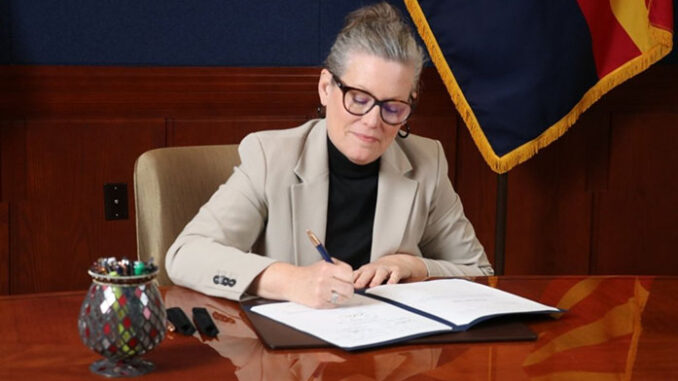
On Friday, Governor Katie Hobbs begrudgingly signed a comprehensive election integrity bill passed on an overwhelmingly bipartisan vote. Every lawmaker present voted for the bills, except for two House Republicans and two Senate Republicans.
Hobbs tweeted after the passage of the bill, “While the bill isn’t perfect, it’s the result of hard-fought compromises from everyone involved. Together, we protected voters and ensured our elections will run free of political interference. Arizonans can rest assured that their voices will be heard at the ballot box.”
I am proud our bipartisan deal passed to secure free & fair elections.
While the bill isn’t perfect, it’s the result of hard-fought compromises from everyone involved. Together, we protected voters and ensured our elections will run free of political interference. Arizonans can…
— Governor Katie Hobbs (@GovernorHobbs) February 8, 2024
According to the Arizona Capitol Times “Hobbs acknowledged Friday she really didn’t get anything out of the deal.”
The bill, seen as a Republican victory, was passed after months of negotiations between the Governor’s Office and Democratic and Republican lawmakers, to solve Arizona’s election timeline issue created when the US Congress changed the Electoral Count Act.
Supporters say the legislation, HB 2785, sponsored by Rep. Alex Kolodin, provides a comprehensive solution to correct election deadline conflicts, allowing Arizona to complete its election tasks by the new federal deadline.
Supporters say the bill also puts into law critical election integrity reforms to improve election procedures and strengthen voter confidence.
For election integrity advocates, the bill:
● Prevents Arizona’s overseas military voters from being disenfranchised by Congress and ensures that Arizona’s electoral college votes will be counted.
● Enshrines signature verification standards for early ballots into law, for the first time in Arizona history, in order to prevent voter identity theft.
● Provides speedy access to ballot curing data to political parties to ensure voters are not disenfranchised.
● Allows counties to replace signature verification with voter ID for mail-in ballots returned to voting locations. (Starting 2026)
● Hard count chain of custody for mail ballots dropped off at polling places on Election Day.
● Prohibits accessing election results before ballot tabulation is complete and requires elections officials to post system log files on the internet within 48 hours after ballot counting is complete to verify compliance.
A significant legal perspective provided by the case of Lake v. Hobbs sheds light on the fact that, prior to Friday, Arizona did not have legally binding signature verification standards at all. According to the ruling, under then-existing law “The question after the comparison is whether the signatures are consistent to the satisfaction of the recorder, or his designee. This, not the satisfaction of the Court, the satisfaction of a challenger, or the satisfaction of any other reviewing authority, is the determinative quality for whether signature verification occurred. It would be a violation of the constitutional separation of powers – see Ariz. Const. art. III – for this Court, after the recorder has made a comparison, to insert itself into the process and reweigh whether a signature is consistent or inconsistent.”
This opinion emphasizes the autonomy and finality of the recorder’s decision in the signature verification process under prior law. Since signature verification is the sole means of confirming the identity of an early voter, the bill marks a significant step forward in protecting voter identities since now, for the first time, there is a legal basis by which a county’s signature verification decisions can be judicially challenged.
The legislation also addresses concerns about the security of election systems by mandating that system access logs be posted on the internet within 48 hours after ballot counting is complete. This transparency measure allows for public scrutiny and verification of the election process integrity, including checks for unauthorized access or potential hacking attempts – something of great concern to the Trump campaign in the 2020 general election.
Additionally, the bill’s provision for speedy access to ballot curing data to political parties has sparked discussions about its potential impact on election outcomes. Critics argue that this could disproportionately benefit one party over another, referencing the recent Attorney General race where the disparity in ballot curing practices was highlighted. They suggest that with equitable access to curing data, outcomes could shift, underscoring the importance of fair and balanced election procedures.
These additions to the election integrity bill underscore the complex balance between ensuring electoral security, maintaining transparency, and protecting voters’ rights, with the ultimate goal of enhancing public confidence in the electoral system. The disparity in the ability of the Democratic and Republican parties to cure early ballots has been highlighted by some as the reason that Abe Hamadeh ultimately fell a few hundred votes short of Kris Mayes.
